- Home
- Lisa Gardner
The Guy Who Died Twice
The Guy Who Died Twice Read online
ALSO BY LISA GARDNER
NOVELS
The Perfect Husband
The Other Daughter
The Third Victim
The Next Accident
The Survivors Club
The Killing Hour
Alone
Gone
Hide
Say Goodbye
The Neighbor
Live to Tell
Love You More
Catch Me
Touch & Go
Fear Nothing
Crash & Burn
Find Her
Right Behind You
Look for Me
Never Tell
SHORT WORKS
The 7th Month
3 Truths and a Lie
The 4th Man
An imprint of Penguin Random House LLC
penguinrandomhouse.com
Copyright © 2019 by Lisa Gardner, Inc.
Excerpt from Never Tell copyright © 2019 by Lisa Gardner, Inc.
Penguin supports copyright. Copyright fuels creativity, encourages diverse voices, promotes free speech, and creates a vibrant culture. Thank you for buying an authorized edition of this book and for complying with copyright laws by not reproducing, scanning, or distributing any part of it in any form without permission. You are supporting writers and allowing Penguin to continue to publish books for every reader.
DUTTON is a registered trademark and the D colophon is a trademark of Penguin Random House LLC.
ISBN 9781524745400
This book is a work of fiction. Names, characters, places, and incidents either are the product of the author’s imagination or are used fictitiously, and any resemblance to actual persons, living or dead, business establishments, events, or locales is entirely coincidental.
Version_1
Contents
Also by Lisa Gardner
Title Page
Copyright
THE GUY WHO DIED TWICE
Author’s Note
Preview of Never Tell
About the Author
“How was my day? Well, in the category of strangest case, I win!”
“Not so fast. Strangest case is highly competitive and you know it.”
“Ah, but first thing this morning, I had a man appear at Boston HQ, requesting to speak to the ‘detective in charge’ regarding a murder. His own.”
“As in he thought he was going to be killed?”
“Nope.” Detective D. D. Warren paused briefly while loading the dishwasher and grinned at her crime-scene-analyst husband. “As in he thought he was already dead.”
* * *
* * *
D.D. and Alex finished cleaning up the kitchen together. D.D. did the honors of checking on their son, Jack, who was fast asleep in his race-car bed with his partner in crime, a black and white spotted pup. Kiko raised her head at the intrusion, yawned hugely, then settled back down. D.D. shut the door and walked to the family room, where Alex was waiting with the rest of their nightly ritual—two glasses of red—and a seat on the sofa next to him.
“So your guy thought he was the target of a murder?”
“My guy considered himself dead. Stone-cold, no pulse, no brain activity, dead as a doornail, dead.”
Alex handed her a glass of wine. She snuggled up against him on the sofa. “All right, start at the beginning.”
“So. I get a call from the desk officer. He has a civilian reporting to have information on a homicide. Phil goes down to check him out. Ends up returning with him to the unit. Guy appears to be mid-sixties, white male, unkempt. He had a straggly beard, torn clothes.”
“Homeless?”
“Mmm, too clean for street life. But first glance, probably on the mad side of scientist.”
“Okay.”
“He gives his name as Adam LaToile. Apologizes profusely that we must see him like this. Please don’t look too closely, he might be contagious, he’s not sure. We should all keep our distance. And he’s very sorry to report that he’s dead.”
“Wait, this la TWALL guy has an infectious disease?” Alex pulled back, eyed her sternly.
“I admit we all took a step away. But no. He doesn’t have a disease. He’s dead. Which is what he fears might be contagious.”
Alex frowned at her. “Does he think he’s a zombie?”
“According to him, he’s had concerns for some time about his physical health and well-being. Then this morning, he woke up to realize it had already happened. They’d done it. He was dead.”
“Who is they?”
“Um, this part gets a little sketchy. Others? Better people than him? Like some society for good who realized what a scourge he was on the planet—”
“He used the word scourge?”
“Absolutely. Very intelligent, refined speaker. No lack of education. Sanity, maybe, but not education.”
“So they killed him. How?”
“He didn’t know. What mattered was that he was dead. He was very sorry about it. And he felt it was his responsibility to report it to the authorities as quickly as possible so we could take appropriate actions.”
“Umm . . . like, bury him?”
“We’re still not sure. Neil asked him if he was hurt, had any wounds, injuries. Nothing. Phil offered him a glass of water. Which Mr. LaToile accepted and drank. Phil pointed out to LaToile that if he was drinking, then he probably wasn’t dead. Mr. LaToile handed back the cup, and insisted, no, he was dead. Still definitely dead. Happened first thing this morning.”
Alex sat back. “Okay. As strange cases go, this feels like a contender. Except, isn’t this a psych case, not a homicide?”
“Fair enough. While Phil set up the man in the conference room, Neil ran background on the prints recovered from the cup. Mr. LaToile, it turns out, lives in Back Bay, is apparently worth a small fortune, family money, and, yes, has spent some time in and out of various ‘wellness centers.’ No criminal record, but a long battle with depression. Neil placed a call to the home number, got a wife, who apologized for her husband bothering us and said she’d arrange for their driver to come pick him up.”
“Their driver?”
“Charlie. Who arrived in a Rolls-Royce Phantom, no less. Phil practically swooned. Driver arrives. Mr. LaToile obediently climbs into the vehicle, telling the driver he shouldn’t look at him either, really doesn’t want to contaminate any more people with his deadness. Neil asks him one more time if he requires any medical attention. Nope, just dead, nothing to be done for him now. Driver closes up the vehicle, pulls away.”
D.D. took a fortifying sip of her wine, regarded her husband. “Two hours later, guess what?”
“No!”
“Yep. We get a call from Mrs. LaToile. Our dead guy is now really dead.”
Nine hours earlier . . .
“You’re sure he’s dead?” D.D. asked Neil, a former EMT turned Boston homicide detective.
The notoriously youthful-looking redhead pulled back the sheet in the upstairs bedroom of LaToile’s house, revealing Adam LaToile’s body, clad in navy-blue silk pajamas and lying on its side with a giant knife jammed between the shoulder blades.
“That’s pretty dead,” Phil chimed in from behind D.D.
Phil and Neil’s third squad mate, Carol, was also in the room, photographing away. The LaToiles lived in one of the biggest Back Bay town houses D.D. had ever encountered. Maybe more like two or three town houses, converted into on
e giant, old-money mansion. The master bedroom was roughly the size of D.D.’s entire house. And the furniture, which featured massive pieces of carved mahogany, looked like it had probably once belonged to European royalty before being pillaged by crass Americans a couple hundred years ago.
D.D. wasn’t sure which was creepier—the carved animals peering down from a hulking armoire, the heavy velvet drapes topped by more grinning faces, or the corpse in the middle of the four-poster bed.
“Who found him?” she asked finally, rising to standing.
“The maid. She came up with a tray of tea and crumpets.” Phil pointed to a side table. “I’m not making this up. See, tea and crumpets.”
On a silver platter, no less.
“Maid noticed the covers appeared off, went to adjust them to make sure Mr. LaToile was comfortable. Said when she leaned over, she could see that his face was very pale.”
“Definitely pale.”
“Then, drawing back, her hand hit the handle of the knife beneath the covers, and she screamed for help.”
“What did she touch in the room?” Carol spoke up, standing on the other side of the bed, still documenting away.
“Uh, serving tray, tea set, covers.”
“She draw them down?” Neil asked. “Because the covers were pulled back when I entered the room.”
“No, Manuel did that,” Phil answered.
“Of course Manuel did,” D.D. said. “Who’s Manuel?”
“The manservant.”
“The manservant?”
“Helps with heavier chores. Guess the kind of stuff that can’t be done by”—Phil checked his notes—“Paulette the maid, Ernesto the gardener, Charlie the driver, or Dennis the personal chef.”
“And all these people were around when Mr. LaToile was discovered dead?”
“Yes.”
“What about Mrs. LaToile?”
“Also home. In the sitting room, having her own cup of tea to settle her nerves. It’s been a trying morning.”
D.D. figured she’d be talking to Mrs. LaToile next. “So Mr. LaToile came to see us. Claimed to be dead. But given that we couldn’t find any evidence to substantiate that claim, we sent him back home, at which point . . . ?”
“Mrs. LaToile called their private doctor.”
“Absolutely. A private doctor.”
“He arrived. Gave Mr. LaToile some kind of something.” Phil gestured to the bedside table, which held half a dozen prescription bottles. Neil headed over to examine them. “Mr. LaToile went to bed, Dr. Anil exited stage right, and two hours later . . .” Phil shrugged.
They all nodded. Their dead guy had become truly dead.
“Two antidepressants,” Neil reported from the bedside table. “Plus one antipsychotic med, an antianxiety drug, and a sleep aid. Frankly, if our guy took all these at once, he wouldn’t have needed the knife in his back.”
“Which is why Dr. Anil oversaw the administration of all of Adam’s medicines,” a voice uttered behind them.
D.D. turned to see an older woman standing in the doorway. She had impeccably styled silver hair and wore a sharp-cut dove-gray pantsuit and an impressive silver brooch. A gorgeous silk scarf was artfully tied around her neck. Hermès, D.D. presumed, or something equally expensive.
“Mrs. LaToile,” she guessed.
The woman nodded sadly.
“I’m sorry for your loss.” D.D. closed the gap between them. “It would help us considerably if I could ask you a few questions about your husband.”
“Poor Adam. He didn’t deserve this.”
“Of course. Is there someplace we could talk?”
The woman hesitated. Up close, D.D. could see the bruises around the woman’s eyes, the tightness of her features. Sleepless nights, she sensed. Whatever was going on in this house of wealth and privilege, it had clearly been taking its toll on the residents. A wife who appeared to be exhausted. A husband who’d started the day claiming to be a corpse and ended the day being one.
“The sitting room,” Mrs. LaToile conceded. She turned and headed downstairs. D.D. took that as her cue to follow.
The sitting room was off the kitchen. A beautifully appointed space done in shades of cream and sage, with gleaming oak parquet floors, hand-knotted rugs, and bay windows overlooking a back patio bursting with roses. D.D. never saw Mrs. LaToile push a button or ring a bell, but within a minute, the maid—Paulette, D.D. presumed—appeared, bearing another giant tray laden with a full tea service and what appeared to be homemade cookies. Clad in a black-and-white uniform straight out of Downton Abbey, the maid wore her dark hair scraped back in an unflattering bun and had applied blue eye shadow and red lipstick so heavily, her own features were almost impossible to distinguish. D.D. pegged the woman’s age at anywhere between forty and sixty. The woman kept her expression perfectly impassive as she carefully lowered the heavy platter, then poured out tea and placed the cookies in the middle of the table. She departed without ever making eye contact with D.D. or Mrs. LaToile.
An occupational requirement? D.D. wondered. Staff should be seen but never heard, present but never connecting? And what did Paulette think about being a maid at her age, let alone spending day after day parading around in a theater costume? Could it drive a woman to murder, because if D.D. had to wear something that ridiculous on the job . . .
“I’m going to have to ask that your staff remain on the property,” D.D. said. “No one can leave until we’ve had a chance to question them.”
“Should I call a lawyer?”
“Do you think you need a lawyer?”
“Not me! I would never harm Adam. I loved him. My people on the other hand . . . ?” Mrs. LaToile shook her head, clearly distraught.
D.D. didn’t say anything; it wasn’t her place to advise on lawyers. Eventually, when Mrs. LaToile remained staring at the roses out back, D.D. leaned forward and helped herself to a cookie. Real homemade shortbread, with a delicate crust of lemon icing. Amazing.
Mrs. LaToile, she noticed, still didn’t touch her tea or the snacks. Instead, she kept her hand resting on her gold-and-red patterned scarf. It took a moment; then D.D. got it.
“Mrs. LaToile—”
“Martha. You may call me Martha.”
“Martha. What happened to your neck?”
“He didn’t mean it,” she said, her gaze still on the window.
“Who, Martha?”
The woman finally shifted, looked at D.D. “Adam. You have to understand. He’s such a sweet man. And so smart, so incredibly smart.” She winced. “I mean, was. Was such a sweet man. Adam in his right mind wouldn’t hurt a fly.”
“Was Adam not in his right mind?”
“He suffered terribly from depression.”
“I’m sorry to hear that.”
“It ran in his family. His mother was institutionalized shortly after Adam’s birth; his uncle, too. His older brother Clarence killed himself. Didn’t even make it past sixteen. Then, when Adam’s own daughter died at fifteen . . .”
“Adam’s daughter?”
“He was married once before. A lifetime ago. As you can imagine, the death of a child . . . It takes such a toll.”
“Does he have other children?”
“No.”
“Other wives?”
“I married Adam ten years ago. We met . . . Well, it hardly matters. I knew about his past, of course, and his long battle with depression. But especially given his brother’s suicide, Adam swore to me he’d never do such a terrible thing. He’d fight harder. He promised me.”
“Mrs. LaToile, your neck?”
The woman sighed heavily, loosened her scarf, revealing the full ring of dark bruises.
“Your husband tried to strangle you.”
“He didn’t mean it,” Martha repeated.
“Mrs. LaToile, by
all appearances, your husband tried to kill you.”
“No, you don’t understand yet. He wasn’t trying to kill me. He was trying to kill himself. Or rather, since he’d promised he’d never commit suicide, he was trying to get me to do it for him.”
“He strangled you, hoping you’d fight back, and kill him in the process?”
Mrs. LaToile nodded sadly.
“It’s that when you stabbed him in the back?”
“Oh no. I would never harm him. I knew what he was doing. Adam. My poor, poor, love.”
“When happened after Adam attacked you, Mrs. LaToile?”
“I’m not sure. It was last night. Adam went a little crazy. He grabbed me by my neck. Squeezing and squeezing. I tried to tell him to stop, to get him to look at me. But it was like he wasn’t even there. Manuel heard the disturbance. He entered our room in time to pull Adam off. Adam collapsed onto the floor, sobbing hysterically. He was sorry, so terribly sorry. It’s happened before. When he’s deep into one of his spells . . . He has these moments when he’s just not himself.”
“This has happened before?”
“Every now and then. But not lately. It’s been . . . years, I would say. Two or three?”
“Then what happened?”
“Manuel fetched a glass of water. We gave Adam his pills and watched until he swallowed. Then Manuel helped tucked him into bed. Adam fell asleep. This morning, he woke up, looked right at me, apologized again, and told me he was dead.”
Back at home on the sofa . . .
“Wait,” Alex interrupted D.D. “This guy tried to kill his wife, then declared himself dead?”
“Apparently.”
“Is that his way of apologizing, or like some misguided manifestation of guilt? He’s so awful, he should be dead?”
“Oh, it’s better than all that.”
“Better?”
“It’s a syndrome. Enter Dr. Anil.”
Seven hours earlier . . .
“Normally, Sergeant, given doctor-patient confidentiality, I would not speak to you regarding the mental health of one of my clients. But given the circumstances—”

 Find Her
Find Her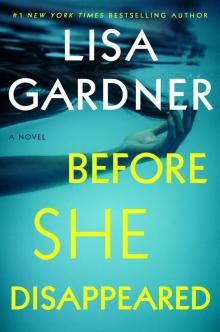 Before She Disappeared
Before She Disappeared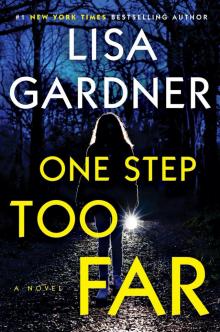 One Step Too Far
One Step Too Far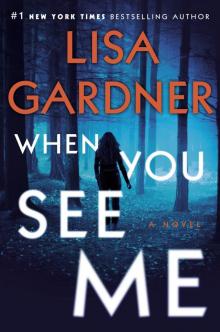 When You See Me
When You See Me Never Tell
Never Tell Touch & Go
Touch & Go The Survivors Club
The Survivors Club MacNamara's Woman
MacNamara's Woman Love You More: A Novel
Love You More: A Novel Gone
Gone The Perfect Husband
The Perfect Husband Maggie's Man: A Family Secrets
Maggie's Man: A Family Secrets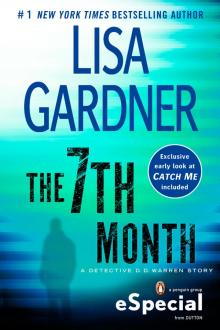 The 7th Month
The 7th Month The Neighbor
The Neighbor Hide
Hide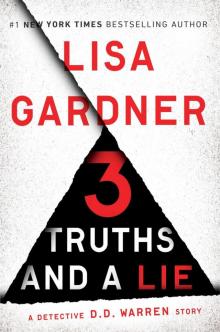 3 Truths and a Lie
3 Truths and a Lie Catch Me
Catch Me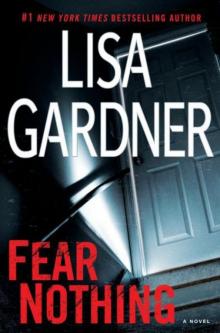 Fear Nothing: A Detective
Fear Nothing: A Detective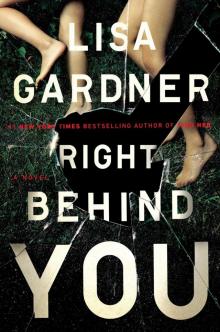 Right Behind You
Right Behind You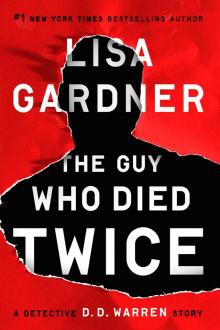 The Guy Who Died Twice
The Guy Who Died Twice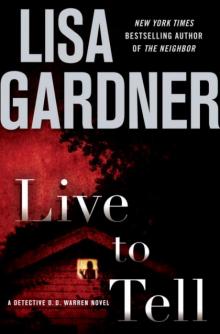 Live to Tell: A Detective D.D. Warren Novel
Live to Tell: A Detective D.D. Warren Novel Live to Tell
Live to Tell Maggie's Man: A Family Secrets Novel
Maggie's Man: A Family Secrets Novel The Other Daughter
The Other Daughter Alone
Alone Crash & Burn
Crash & Burn The Detective D. D. Warren Series 5-Book Bundle
The Detective D. D. Warren Series 5-Book Bundle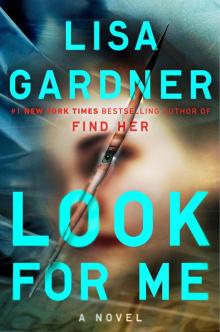 Look for Me
Look for Me Love You More
Love You More The FBI Profiler Series 6-Book Bundle
The FBI Profiler Series 6-Book Bundle The Third Victim (Quincy / Rainie)
The Third Victim (Quincy / Rainie) Say Goodbye
Say Goodbye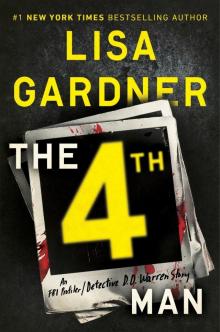 The 4th Man
The 4th Man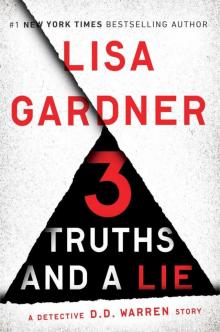 3 Truths and a Lie: A Detective D. D. Warren Story (Kindle Single)
3 Truths and a Lie: A Detective D. D. Warren Story (Kindle Single) Brandon's Bride
Brandon's Bride